Workers, not shareholders, bear the burden of taxes in the UK. Here’s how we can fix this broken system
A decade of cuts to corporation tax has therefore combined with increases in employers’ national insurance contributions to shift the burden of taxation away from shareholders and onto workers


Over the last ten years, the UK has created one of the most regressive systems of corporate taxation in the developed world.
As part of the Government’s “corporate tax roadmap”, the UK’s corporation tax rate has been cut from 30 per cent in 2005-06, to just 19 per cent today. A further reduction to 17 per cent is planned within this Parliament. By comparison, the total rate of tax on corporate profits is just over 30 per cent in Germany, and 33 per cent in France. Even Donald Trump’s recent tax cuts haven’t reduced the US corporation tax rate to as low as the UK’s.
But this is has not been a simple tax cut for businesses. At the same time, the rates of employers’ national insurance contributions have risen. Employers’ NICs now generate substantially more for the Exchequer than corporation tax.
While both corporation tax and employers’ NI contributions are taxes on businesses, they are levied on different things: corporation tax is a tax on profits, whilst employers’ national insurance is a tax on payrolls. Available economic evidence suggests that corporation tax is more likely to be paid by the owners of a business, while employers’ national insurance contributions are much more likely to be passed on to workers in the form of lower wages or less employment.
A decade of cuts to corporation tax has therefore combined with increases in employers’ national insurance contributions to shift the burden of taxation away from shareholders and onto workers. The UK is now entering the longest period of wage stagnation since the 1860s, and our business tax system is only exacerbating the problem.
The result is that the burden of taxation has shifted: more tax is now paid by companies which employ a lot of people but are not so profitable, and less by companies which are highly profitable but which don’t employ many workers.
Meanwhile, many multinational companies have been paying no tax at all. By shifting their profits to subsidiaries in low-tax jurisdictions, some multinationals have been able to claim that they have made very low profits in the UK, limiting their corporation tax liability. Some of the big tech companies have been particularly accused of exploiting complex accounting tricks to pay very low rates of tax. Among the most vociferous critics of such tax avoidance are domestic businesses which are unable to engage in such practices and who must effectively make up for the lost revenues by paying higher taxes themselves.
There should be a fundamental rethink of the system of corporate taxation in the UK. First, there should be an increase in corporation tax from 19 per cent to 24 per cent. The revenues from this should be used to cut employers’ national insurance contributions by 2 per cent from 13.8 per cent to 11.8 per cent. This would shift the burden of taxation from workers onto shareholders and could therefore lead to an increase in wages, boosting the economy more broadly.
Second, the introduction of a new tax designed to prevent multinational tax avoidance. The “Alternative Minimum Corporation Tax” put forward by IPPR would link a company’s tax liability to its sales or turnover in the UK, ensuring that firms were not able to avoid taxes by shifting their profits to low-tax jurisdictions.
While there is not currently any reliable data on the extent of multinational profit shifting, the Exchequer is estimated to lose somewhere between £3bn and £12bn each year as a result of these practices. The AMCT would capture a significant portion of these lost revenues, which would go some way to closing the gap in the NHS budget.
The vast majority of responsible businesses pay their taxes. But after eight years of austerity borne primarily by the most vulnerable in our society, it’s time to rebalance the tax system to ensure that all pay their fair share.
Join our commenting forum
Join thought-provoking conversations, follow other Independent readers and see their replies
Comments
Bookmark popover
Removed from bookmarks